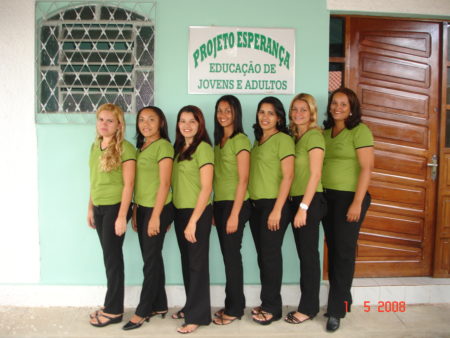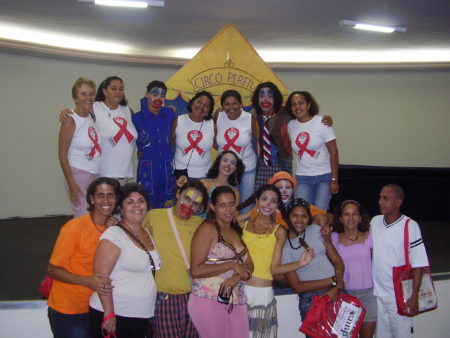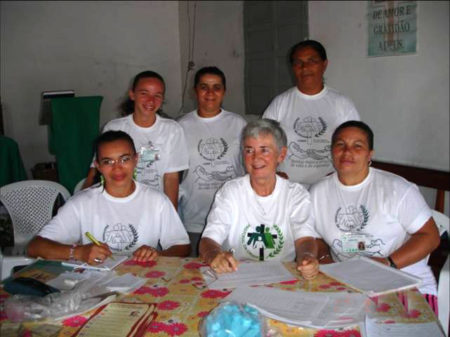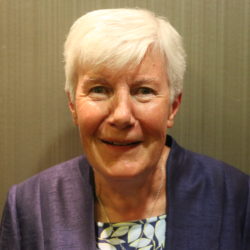Brazil is the sixth most populous country in the world, and the largest in South America with a population of approximately one 185 million. It is home to a rich mix of cultures, ethnic groups, religions and life-styles. The majority of the population is nominally catholic but, in recent decades, there has been a huge growth in the number of fundamentalist sects. While Brazil is a wealthy country in terms of natural resources and industry, the stark reality is that the bulk of the wealth is in the hands of a tiny minority. This gives rise to gross inequality and corruption and huge areas of extreme poverty where violence and drugs reign supreme.

The State of Paraíba is situated in the north-east of Brazil with a population of approximately 4 million. It is considered one of the poorest States in terms of development (both industrial and agricultural) and suffers from long spells of drought. Many people migrate to the wealthier south where they earn their living in the “undocumented” economy. They are, therefore, effectively deprived of a minimum salary (150 euro) per month) and other basic human rights. Many live in precarious situations in the larger cities where there is little infra-structure – inadequate sanitation, no access to clean drinking water, poor roads and inaccessible housing. Violent crime, drugs and sexual exploitation (of both women and children) abound and many favellas (shanty towns) are under the control of known drug barons and criminals.
 Srs. Gabrielle, Miriam and Celine
Srs. Gabrielle, Miriam and Celine
This is a broad out-line of the situation where we, Gabrielle Kieran, Celine Conway and Miriam Brennan live and work. We are located in the two main cities of Paraíba – João Pessoa (the State Capital) and Campina Grande. The Mission was founded in 1982 by the Sisters of Mercy, Diocese of Cashel & Emly. Since 1982, fifteen Sisters from three Irish Provinces lived and worked here. In a society which lacks adequate health, housing, educational, employment and social services we endeavour to work alongside the people; to accompany their struggle; to provide basic skills and services and to encourage and affirm them as they strive to improve their lives and give a better future to their children. Our main thrust in in the areas of health, education, environment and community development.
 Literacy Group Monitors
Literacy Group Monitors
The north east of Brazil has the highest indication of illiteracy in the country – almost 8 million which corresponds to 50% of the total number in the county. In the State of Paraíba, 36.7% of adults between 49 and 59 are illiterate. In an effort to lower these statistics and help people fulfill a lifelong dream to read and write, Projeto Esperança, Educação de Jovens e Adultos (Project of Hope, Education for Youths and Adults) was set up in 2001 by Celine. The project caters for youths and adults (15 +) who, for various reasons were deprived of the opportunity of education. Unfortunately those who are disadvantaged and marginalized in society do not clearly understand the advantages of education and this only serves to widen the gap between rich and poor. The aim of the project is to provide people with basic literacy and numeric skills; enable people to become agents of their own liberation through access to education; provide a skill that increases employment prospects; promote social action within the communities where the participants live and work; develop a process to enhance self esteem among participants and stimulate a desire in the participants to continue their formal education. Since 2001 over 1,300 adults have achieved basic literacy skills while 75% are continuing their formal education in the local public schools. We have six classes each year running from February to December. The Monitors receive specific training and supervision. The Project is recognized by the Municipal Educational Department and has the use of the classrooms in the local schools.
 Indian Day Party
Indian Day Party
In 1996, Miriam set up a preschool play group which caters for 50 children between the ages of three and a half and five years. It operates from Monday to Friday on a sessional basis. It is staffed by four local women who received initial training; another woman who is responsible for cooking and cleaning; and a community health worker who provides support and on-going training. Last year we were selected to pilot an Oral health Programme. Two Dentists visit the play-group weekly; give the children orientation in oral health and hygiene and arrange dental treatment where necessary. The children participate in play activities, drawing and painting, song and dance, local festival and cultural events. They also receive informal education and a healthy snack.
 Lilac House Meeting
Lilac House Meeting
The percentage of women in the northeast of Brazil who suffer from domestic violence, abuse, discrimination etc is extremely high. This violence is rooted in the inequality of relationships between men and women. A headline in a recent local newspaper showed that the city of João Pessoa has one of the highest rates of female deaths in the country due to violence. A relatively new law called “Lei Maria da Penha” now offers protection to the victims and rigorous punishment of the aggressors. In an effort to support these women there are various women’s centres around the city including “Casa Lilás” (Lilac House) where Gabrielle and two lay voluntary women work. The centre offers a safe space where women can share their problems through group activities and also on a one to one basis. Various activities are carried out in the centre:
- Mini co-operative producing hand-crafts – painting, appliqué, card-making etc
- Six women work to help the local environment visiting the homes; alerting re water waste, rubbish, recycling etc and offering workshops on how to recycle newspaper, plastic mineral bottles etc
- A recent project is well underway making cloth bags to replace plastic bags. The aim is that the local bread shops will promote these.
- A small group has studied how to make natural medicines – cough syrups, ointments and elixirs which are sold at a minimal price in the community. They also make a food supplement to help combat malnutrition
- Open days are held at the centre and issues like healthcare, nutrition, first-aid etc are dealt with. Courses are also given in cooking healthy food at minimal cost; recycling; women´s health, art and music. Some of these courses are open to the wider community and are conducted by the women themselves
- A group of 12-15 adolescents meet weekly with a monitor (psychology student). They have produced puppet shows and dance with themes related to the environment.
As one woman put it: “Casa Lilás gives more life to our lives and our hope is that we give more life to the lives of other women.”
 AIDS Theatre Group
AIDS Theatre Group
In the last few years the issue of AIDS in Brazil has been dealt with extremely well by Government Programmes. Though there has been an overall evident improvement, in no way has the battle against AIDS been won. The challenges are still there, challenges that call for a response. The suffering of people with AIDS grows deeper than the actual physical illness. Gabrielle is part of a team which works at a centre for people who are HIV positive, and also with patients in the wider community. They are very much aware that the greatest pain and suffering comes from isolation, rejection, exclusion, discrimination and prejudice. The chief concern is to companion these people and, through activities like workshops, regular meetings, home and hospital visits, work with them at raising their self esteem and dignity. A strong bond of friendship has been forged over the years and many people who are living with AIDS have joined the group in helping those recently infected. Through campaigns, information services, school and college visits people are invited to reflect on gender issues, to accept the AIDS sufferer without discrimination respecting diversity, sexual orientation or lifestyle.
 Miriam and her Team
Miriam and her Team
Miriam established and is actively involved in a branch of Pastoral da Criança (Pastoral Care of the Child) which is a national voluntary organisation which cares for babies and children from 0-6 years in the local community as well as pregnant mothers – especially first-time, adolescent and at-risk mothers). We are a team of 13 women (7 trained leaders and 6 support workers). Each month we visit and accompany approximately 80 babies/children in their homes. We also have a monthly weighing in the local church where we identity babies suffering from malnutrition, dehydration or other childhood illnesses. We provide “multi-mistura” a fortified food for those who are under-weight; teach the mothers to make “soro” – a rehydration drink for those who need it and refer babies with other problems to the relevant health services. We also celebrate life on the day – give a healthy snack to mothers, children and extended family! While the children have “play-time” we try to give a basic orientation on health, hygiene and child-rearing to the mothers.

Brazil is a key-player in world environmental issues being home to the Amazon rain forest. In recent years, deforestation has resulted in huge ecological disasters such as flooding and land-slides with ensuing loss of life, homes, livestock and property. The accumulation of rubbish (plastic bags, cans, plastic, etc) causes havoc-polluting and blocking up rivers, lakes and sewage systems. There is a growing awareness of the need to address this problem which gives rise to many fatal diseases and other natural disasters. In 2001 Celine set up a Co-Operative (COTRAMARE) on the city dump in Campina Grande which is located on the outskirts of the city. Over 200 families are involved on the dump where they eke out a very basic living sifting through the rubbish of the city. There are approximately 500 workers including women and children. The vast majority live close by in the community of the Mutirão, some come from other nearby communities while others live on the actual dump. The objective of the cooperative is:
- To offer the workers a fair price for their products
- To give the workers a better status
- To improve precarious working conditions (city dump)
- Raise self esteem
- Offer alternative ways of creating income
 Recycling Centre
Recycling Centre
This Co-Operative worked, with difficulties until 2007 when one of our buildings was maliciously burned. We decided to relocate the Co-Operative nearer to the city and we are now renting a large shed. We are piloting a scheme for the selective collection of rubbish in the city – an information sheet was published to inform the public of the importance of separating their rubbish – the workers now go door to door collecting recyclable materials and bring it back to the shed where it is sold to recycling companies. These workers are no longer working on the dump, they have better working conditions; getting a fairer price for their products and have a sense of the important role they play in caring for the environment. Recently they began collecting used cooking oil from homes, hotels and restaurants and are making soap which they sell door to door thus creating an alternative income.
The Chapter Event 2006 Statement of the South Central Province invites us to:
“prioritise areas of extreme poverty. These areas will be addressed through new and existing ministries, the committing of resources, and the use of advocacy with a view to effecting systemic change. We will do this in the context of our belonging to an international congregation within a world wide Mercy network; we will continue to have special concern for our mission area in Brazil.” While we are mindful of the enormity of this challenge we are, at the same time, cognisant that every journey starts with a single step. It is our joy and privilege to be travelling this journey in the company of many Brazilians and to be able to share their story along the way.
Miriam Brennan rsm, Celine Conway rsm and Gabrielle Kieran rsm
South Central Province


